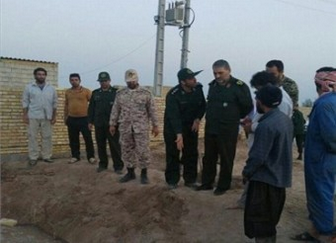The Iranian regime has announced another illegitimate seizure of Ahwazi farmland, confiscating a further 15 hectares from farmers in Dorentash in the north of the province despite the owner’s well-documented ownership.
Regime officials claimed falsely that the farmland had no owners and that the regime was simply appropriating it for the state, a blatant lie which disregards the owner’s title deeds and other documents proving ownership which date back to the era of the Shah.
In light of increasing tensions with the regime domestically and across the Middle East, the ‘Islamic Revolutionary Guards Corps’ (IRGC) forces, known as the ayatollahs’ iron fist, have been intensifying their brutal policies in an attempt to pre-empt and crush any resistance. One of these policies is the regime’s efforts to impose a demographic change in the Ahwaz region, whose ethnically Arab peoples have always been viewed as a threat by successive regimes since Iran’s British-backed 1925 annexation of Ahwaz.
Land confiscation is a key part of this policy, with successive rulers since the Shah in the 1960s introducing so-called ‘land reform’ plans across Ahwaz to seize large areas from their rightful Ahwazi Arab owners and ‘reassign’ them to ethnically Persian incomers as an incentive to move to the region in order to change the demographic balance.
Also recently, a massive expanse of farmlands in the Rofaie area in what’s now known as Khuzestan province was confiscated by the IRGC, who used a variety of pretexts for this theft, including a supposed plan to build cooperative businesses to benefit Iranian military veterans and give jobs to their families. The seizure was presented to the landowners as an unquestionable fait accompli, with the actual landowners simply dispossessed and left destitute.
The owners of the land have no right of legal complaint and receive no compensation. This policy, despite being flagrantly illegal under international law, has continued up to the present day, leaving countless Ahwazi landowners and farmers whose ancestors had farmed the lands for many generations homeless and destitute.
